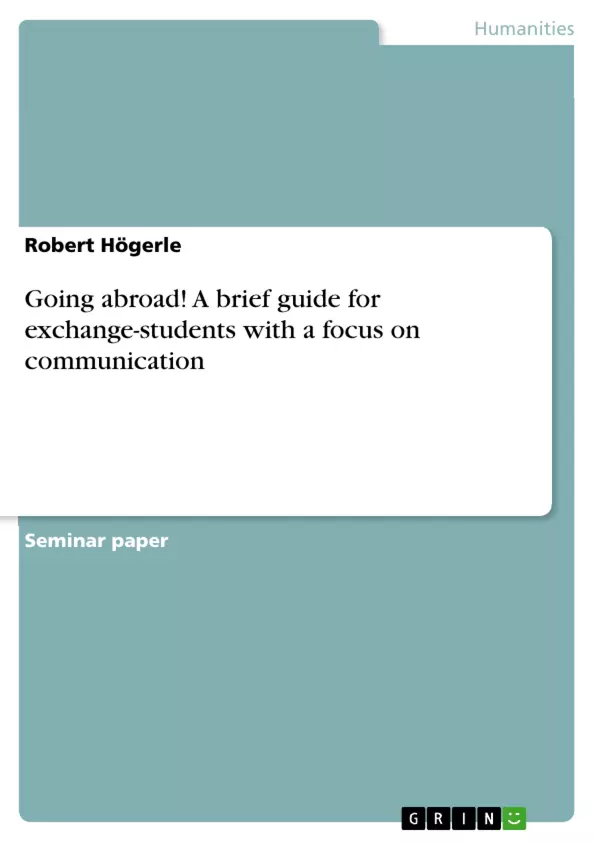"Don’t tell me how educated you are, tell me how much you have travelled."
– Mohammed1
Culture is the widening of the mind and of the spirit.
– Jawaharlal Nehru2
Even though some of the above mentioned personalties caused inter-cultural
disputes, it must be admitted, that the quotes do hit the bull's eye.
Travelling and the with this connected insight in different cultural spheres do have a
immense impact on behaviour, experience and acting3 and these as basic pillars of
psychology shapes, whether you like or not your way of communication.
This paper will look on time related values such as Poly- and Monochronicity
as well as the time sense in different cultures in general.
The topic will be described and elucidated with the help of personal experiences
which I gathered during my studies abroad so far.
Inhaltsverzeichnis (Table of Contents)
- INTRODUCTION
- PERCEPTION OF TIME
- DEFINITION
- ATTEMPT OF CATEGORISATION
Zielsetzung und Themenschwerpunkte (Objectives and Key Themes)
This paper aims to explore the impact of cultural differences on time perception and communication. Using personal experiences from studying abroad, the author compares and contrasts the contrasting time-related values of South-Central Europe and East Asia, particularly focusing on the concepts of monochronic and polychronic time.
- Cultural differences in time perception
- Monochronic and polychronic time cultures
- The role of time in communication and behavior
- Personal experiences of time-related cultural differences
- The impact of time perception on cultural interactions
Zusammenfassung der Kapitel (Chapter Summaries)
- INTRODUCTION: This chapter introduces the author's personal experience in GSIK, an inter-cultural competence program, and their exposure to South-Central European and East Asian cultures through studies in Italy and Japan, respectively. It highlights the impact of these experiences on their own cultural perception.
- PERCEPTION OF TIME: This chapter explores the universal concept of time and its measurement across cultures. Despite a standardized system of hours, minutes, and seconds, the author points out that cultural differences lead to variations in the perception of time's length and importance.
- DEFINITION: This chapter delves into the definition of monochronic and polychronic time cultures. The author cites from "Intercultural communication: a reader" and defines polychronic cultures as prioritizing people and the present moment over schedules, while monochronic cultures emphasize schedules, punctuality, and timekeeping instruments.
- ATTEMPT OF CATEGORISATION: This chapter analyzes the author's experiences in Italy and Germany, highlighting the contrasting time-related values of these countries. The author suggests that Germany is a predominantly monochronic culture, while Italy leans towards polychronic values. The author uses personal anecdotes from their experiences in both countries to illustrate these differences, highlighting the impact of cultural variations on social interactions and expectations regarding punctuality and scheduling.
Schlüsselwörter (Keywords)
This paper explores the concept of time in different cultures, focusing on the contrasting themes of monochronic and polychronic time perception. It uses personal experiences from studies in Italy and Japan to illustrate the impact of cultural differences on communication and behavior. The key terms and concepts explored include: intercultural communication, time perception, monochronicity, polychronicity, South-Central European culture, East Asian culture, and personal experiences.
Frequently Asked Questions
What is the difference between monochronic and polychronic time cultures?
Monochronic cultures (like Germany) prioritize schedules and punctuality, while polychronic cultures (like Italy) prioritize people and relationships over strict timekeeping.
How does cultural background affect time perception?
Even though time units are standardized worldwide, different cultures perceive the length, importance, and social meaning of time differently.
What are the characteristics of a monochronic culture?
They emphasize punctuality, strict adherence to plans, and usually focus on doing one task at a time.
How do polychronic cultures handle schedules?
In polychronic cultures, schedules are more flexible, and social interactions often take precedence over being "on time."
What is the goal of this guide for exchange students?
It aims to help students understand intercultural differences in communication and time perception to navigate their studies abroad more effectively.
- Quote paper
- Robert Högerle (Author), 2011, Going abroad! A brief guide for exchange-students with a focus on communication, Munich, GRIN Verlag, https://www.grin.com/document/271959



